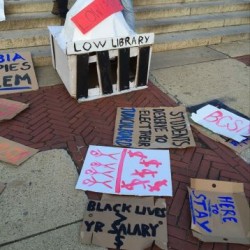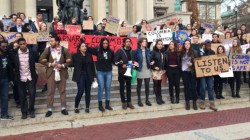The Barnard Columbia Solidarity Network (BCSN) started protesting on Low Steps at 3:30 today, with a sizable but not overwhelming crowd. The network amended a set of demands from the Student Power Coalition (SPC) in order to reflect the race critical lens supported by its membership—member groups include the Mobilized African Diaspora (MAD), Columbia Divest for Climate Justice, Divest Barnard, Student-Worker Solidarity, No Red Tape, and The International Socialist Organization. While it may seem that the BCSN and SPC are separate entities, the former is actually a reworking of the latter.
The demands include calls for the divestment from fossil fuel companies, the creation of a 24/7 rape crisis center, the elimination of the student contribution to tuition, the increase of student wages to $15/hr, the hiring of more faculty of color, the admittance of more low-income and black students, and the securing of affordable housing for those affected by the Manhattanville expansion.
The protest itself is relatively tame, although the true outrage comes through in the signage. A sampling of the signs: “Columbia is racist,” “Stop criminalizing activism,” “Solidarity not salaries #BCSN,” and “Rapists are guaranteed a hearing but activists aren’t?!” The rest of the protest involved chanting and the introduction of various member groups, although a few leaders were missing.
Barnard Columbia Solidarity Network (BCSN) Demands
- Revoke the financial support and and social license that the University, as a global political actor, grants the fossil fuel industry. This industry drives climate change and profits from environmental destruction and death, predominantly in Black communities & communities of color, locally and globally. We demand that Columbia divest our endowment from the top 200 publicly-traded fossil fuel companies.
- Establish systems of support that center the disproportionate violence targeting women, queer, trans*, and gender nonconforming people of color. We demand a rape crisis center that is physically open 24 hours/day including all days during which students are housed on the University campus, an increase in queer and trans* staff of color at SVR, and a hotline staffed by trained professionals who are equipped to address the experiences of trauma in marginalized communities and can provide immediate accompaniment to services off campus. These systems of support must include a radical re-structuring of CPS, Furman, SVR, & ODS for Barnard & Columbia, with a critical lens that benefits people of marginalized identities.
- Minimize the financial burden and instability that Black and low-income people, from both national and international contexts, experience through Columbia University. This necessitates an enforcement of the mandate that the University pay workers within two weeks and an expansion of the work-study exemption program. We demand an elimination of the student contribution and an increase of wages to $15 per hour for all work-study, casual employment, and campus jobs, including unpaid volunteer positions at direct service organizations such as Sexual Violence Response, CUEMS, Well Woman, Nightline, and Community Impact.
- Invest in more faculty, space, and funding that will directly benefit the academic experience of marginalized students of color at Columbia. We demand Columbia hire more faculty of color across all schools and departments; reallocate physical and financial resources for IRAAS, IRWGS, CSER, IAS, MEI, SAI; & restructure the Core Curriculum to move Intro to African-American Studies and Intro to Comparative Ethnic Studies from Global Core to required Core classes.
- Enhance the quality of life for Black and other marginalized communities on Columbia’s campus. We demand that Columbia admit and retain and increased number of Black students, emphasizing low-income and local students directly affected by Columbia’s expansion. This requires an improved public report guided by students detailing the complexities of Black student life, as well as the creation of a food pantry that serves students, staff, and faculty who are food insecure.
- Initiate the repair of the damage done to the Black communities occupied by Columbia including, but not limited to, Harlem and the Bronx. The University must critically engage with Community Impact as an insufficient and flawed solution by funding more culturally conscious and trauma-informed training for CI and creating additional programs beyond the scope of CI that better engage with the community. We demand the University invest in and actively secure jobs and affordable housing for those affected by its expansion.
We, the Barnard Columbia Solidarity Network, mobilize in a common struggle for liberation. We oppose the University’s prioritization of profit over people, its consolidation of power in the hands of a few, and its lack of transparent decision-making processes. Columbia University, as a historically and structurally oppressive institution, actively obstructs each of our movements.
With this in mind, we collectively put forward these demands.
We stand in solidarity with marginalized and oppressed people within and beyond Columbia University and are committed to build in coalition with those dedicated to dismantling interlocked systems of oppression.
5:44PM: This post has been updated from a previous version in order to distinguish the Black Students’ Organization (BSO) from MAD. Additionally, it includes information clarifying BCSN’s linkage to SPC.
- BCSN signs
- On Low Steps
Photos courtesy of Mason Amelotte


 18 Comments
18 Comments



18 Comments
@Student of Color Just last week, I tried to buy a bag of chips from the Math building’s vending machines. The spiral turned, but the chips didn’t fall. I could tell it was an unconscious bias because a white male got his chips with no problem.
@Anonymous The admission stats are all public. Does the University release retention/four year graduation stats by race, etc?
@Anonymous I demand these losers go away.
@question mark i’m curious; why is it framed in terms of “black + miscellaneous” in many of the demands. “racial category” + “low income” (3) isn’t really combining equal categories, and neither is “black” and “other marginalized communities” (5). I know that Black people are often disproportionally screwed in this country, but hispanic/latinx + southeast asian, among other populations, seem to deserve more than an “other” bin in this conversation; is this really the best way to frame these populations?
@Anonymous A fair point.
To be honest, I don’t know which to be more irked about: the implicit equivalency of “black” and “low income”, or the “and others” bit. It’s super-myopic. (It’s a bit like the phrase “black, white, green or whatever” meaning ‘everyone’. There _are_ other people to be considered.)
In any case, as a low-income white person, I expect they’ve got about as much plan to include me as Trump has plans to celebrate the Prophet’s Birthday.
@Dr. Necessitor Let’s see. Approximately 150 protestors out of 28,000 students. The administration should be afraid. ;-)
@Not Convinced These people are so embarrassing. It’s sad that the most emotional, least logical groups are always the loudest. Welcome to the Columbia Tea Party. Don’t agree with their doctrine? Too bad. Now we’re all associated with it.
@ur gross yikes u suck so much
@Thomas Actually no it’s you people who suck. And good grammar.
@CUNY student We, the Barnard Columbia Solidarity Network, mobilize in a common struggle for liberation. We oppose the University’s prioritization of profit over people, its consolidation of power in the hands of a few, and its lack of transparent decision-making processes. Columbia University, as a historically and structurally oppressive institution, actively obstructs each of our movements.
i didnt follow most of this stuff, but i didnt realize students here understood wth was going on.
this uni is mad rich because it fucks over other people and communities. how yall dont personally pay reparations to harlem is beyond me.
@Thomas I’m sure there a lot of things that are beyond you.
@Anonymous Tsk. Ad hominem. Go back three spaces and skip your next turn.
@Anonymous track button!!!!!
@Anonymous The school was here before Harlem :/
@i am wondering if black liberation is becoming centralized in divestment organizing, how does that treat the identities of POC in non-black areas affected by climate change? I do see the reason that his is very relevant for the US, but I wonder how it will be reflected at the COP21 paris talks that have a more international focus….
either way, realllllllly happy that other activists are starting to center around black liberation.
@if rape happens mostly at night why isnt the crisis center open outside of business hours anyway? I get why maybe not like, 24/7, but i didnt realize it wasnt even open all night on weekends. seems a bit nonsensical.
@the demands are actually really thoughtfully written ?
tbh i thought this was a bit disorganized beforehand, but it really does seem like the groups have worked with the administration enough at this point to narrow down their goals to tangible and achievable ends.
nice.
@bystander Not word for word, and my memory may fail me, but someone from Divest Barnard said something to the effect of:
1) Barnard systematically oppresses trans, non-cis gendered, and non-gender conforming individuals, and
2) trans, non-cis gendered and non-gender conforming individuals are more prone to be affected by climate change, and therefore
3) Divest Barnard stands in solidarity with Columbia Divest for Climate Justice, and everyone else on the stage.
And then she waits, as if she’s expecting some claps and cheers. Needless to say, the crowd was baffled. After a few awkward seconds of silence, the rally continued.